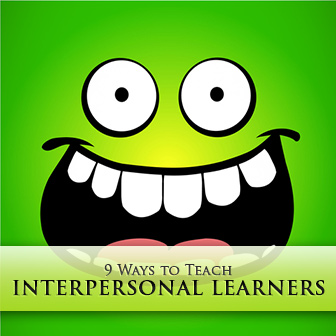They’re always talking to each other.
They volunteer to help you without even being asked. They ask people lots of questions and are often fascinated by what they have to say. They love pair work, group work or any type of task they can do with their classmates. Socializing is their main thing, and that’s because they are interpersonal learners.
Interpersonal learners thrive in social interactions. One of eight types of learning styles or intelligence, as defined by Howard Gardner, interpersonal learners are “people smart” in the truest sense of the word.

Characteristics of interpersonal learners:
- They have no trouble making new friends.
- They do well in collaborative/cooperative activities.
- They are able to “read” people; they understand what motivates them and what intentions they have, as well as moods and temperament.
- They are good at empathizing with others.
- They are very skilled at interpreting faces, gestures and tone of voice.

Use these resources/activities to capitalize on this particular learning style:
-
1
Interviews
Split the class into pairs and have one interview the other, then switch. Students may simply be themselves or choose a famous celebrity they admire and know well. The interviewer has to guess who the famous person is.
-
2
Giving Advice
This is a great way to tap into your learners’ people skills and practice modals. Hand out cards with problems/situations you students may encounter. If you make your own, the cards may say things like, “I have a sore throat” or “I don’t know how to get to the library from here” and so on. Students read the card they were given. You may ask them to elaborate and give more details about their “problem”. The student giving advice uses modal verbs like could, should, or must to give their recommendations.
-
3
Teaching!
Interpersonal learners are good teachers! Go over which words are useful when explaining a sequence of steps (time-order words). Ask them to choose one thing they are good at and to tell the class how to do it – step by step. Language they are expected to use may be words like, first, then, next, and finally.
-
4
Pair Work
There are endless tasks students may do in pairs. Aside from the usual pairwork speaking tasks, like this one, try writing activities in pairs, like writing a story together.
-
5
Group Work
Divide the class into groups of 3-4 students. Give them a group scenario they are likely to face in real life: they must plan a surprise birthday party for a friend. Together they must decide what food and drinks they will serve, who will buy the supplies, who will play the music, in other words, who will be responsible for what. You can give all of the groups the same scenario and later compare. Or give each a different one.
-
6
Role Plays
Interpersonal learners are perfect for role plays. The essence of a role play is to act out a real life situation, so whether you give them a shopping, restaurant or hotel scenario, they will put their people skills and English-speaking skills to the test.
-
7
Leading
Interpersonal learners are natural-born leaders, so if you ever need someone to be in charge, you know who to choose. Give your class a big poster board and tell them they will have to create a poster together as a group. The “leader” will be able to say who will look for pictures to cut out from magazines, who will glue them and who will write on the poster.
-
8
Brainstorming
When working together interpersonal students will come up with some awesome ideas. Use the cards in this Brainstorming Game and ask them to come up with, for example environmental problems we currently face and ideas to deal with these problems.
-
9
Someone Else’s Shoes
Because they are very good at empathizing, ask them to take someone else’s point of view. Read a story with your class, then, tell your students to imagine they are the main character in the story. Ask them to tell you or write about how they felt and why they did what they did.

What to watch out for:
Interpersonal learners are very good at handling people in general, and in most cases will contribute genuine, friendly interactions in the ESL class. But watch out for the following:
- Manipulation, or trying to get their own way;
- Socializing, when they should be doing a quiet activity like reading or writing; or
- Arguing, when their opinion is different from yours or another classmate’s.
Interpersonal learners are a pleasure to have in the ESL class, as they’re always ready to participate and contribute.
Because the ESL classroom is a very social environment, they will feel at ease with most of the tasks you propose. And yet the most wonderful thing is that you will learn as much from them as they will from you.
P.S. If you enjoyed this article, please help spread it by clicking one of those sharing buttons below. And if you are interested in more, you should follow our Facebook page where we share more about creative, non-boring ways to teach English.







